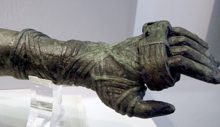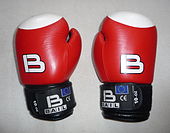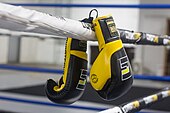Boxing gloves are cushioned gloves that fighters wear on their hands during boxing matches and practices. Unlike "fist-load weapons" (such as the ancient cestus) which were designed as a lethal weapon, modern boxing gloves are non-lethal, designed to protect both the opponent's head and the fighter's hand during a bout. Sparring and other forms of boxing training have their own specialized gloves.
History


Ancient Middle-Eastern and Egyptian depictions of boxing c. 2000 BC showed contests where fighters had a band supporting the wrist. Early depictions of gloves in boxing date back to Minoan Crete c. 1500 BC. The use of hand protection in fighting contests undertaken for sport has been known since Ancient Greece. However, the gloves were very different from those of modern boxing, as was the sport itself. In Ancient Greece, it was common practice to tie strips of leather round the hands for protection. In Roman times, this developed into the gladiatorial cestus, with metal added to the gloves to inflict greater damage. The oldest surviving example of boxing gloves date to around AD 120, coming in the form of two non-matching leather bands that were recovered from excavations at the Roman fort of Vindolanda. The brutality of the sport caused the boxing to be banned in AD 393.
Boxing experienced a revival in Britain around the 17th century. Many bouts were fought with bare knuckles and with no standard rules until Jack Broughton introduced boxing rules known as Broughton's Law in the 18th century, where the gloves were used for practice purposes only. However, many boxers still chose to fight with bare knuckles until 1867 when gloves were mandated by the Marquess of Queensberry Rules.
Modern boxing gloves started showing up towards the end of the 1890s. Over one hundred years of engineering and testing by some of the biggest boxing manufacturers and sport names have helped create safe, durable equipment. Modern boxing gloves include mesh palm, velcro, leather-based stitching, suspension cushioning and new padding for the boxer. The International Boxing Association approves new designs of gloves according to rules around weight and the amount of leather, padding and support allowed.
Features
Boxing gloves usually come with either lace-ups or velcro. In velcro gloves, the velcro acts as a second handwrap that adds more stability to the wrist. Lace-up gloves provide a more snug and secure fit, but unlike velcro gloves, require assistance from another person to lace, and are usually wrapped with tape before the match. Lace-up gloves can be converted to velcro gloves using a hook and loop converter.
Three types of padding commonly used in boxing gloves are horsehair padding, foam padding or a mix of both. Foam padding gloves use latex and PVC foam with shock absorber. Horsehair gloves last longer than foam padding gloves and are environmentally friendly, but are less protective.
In amateur boxing matches, glove color is restricted to red or blue, often with a white "scoring area" at the knuckles to help judges see and record points from a proper punch.
Boxing gloves are worn over hand wraps, which help stabilize the fist area against injuries such as the eponymous boxer's fracture of the fifth metacarpal. The hand wrap is usually made from cotton and is available in either 120 inches (3,000 mm) or 170 inches (4,300 mm).
Types of gloves
| Type | Images | Description | Available size |
|---|---|---|---|
| Bag gloves | 
|
A cushioned glove to protect the athlete's hands against heavy strikes on punching bags; these are the gloves not recommended by trainers for any boxing training, especially for non-sparrers. | 8 oz (230 g) 10 oz (280 g) 12 oz (340 g) 14 oz (400 g) 16 oz (450 g) |
| Bag mitts | Mitts are used to add slight protection to the athlete's hands while striking punching bags while simultaneously strengthening the athlete's hands and allowing for the practice of proper, closed-fist punching technique. | 2 oz (57 g) | |
| Sparring gloves | 
|
Gloves designed to protect both athletes during practice bouts. Usually gloves 2 to 4 oz (57 to 110 g) heavier than competition gloves are selected to spar, to avoid unnecessary injuries. However, in some unique cases of exceptionally strong punching power, gloves of around 20 oz (570 g) could be utilized. Sonny Liston had 22-ounce (620 g) custom-made Everlast gloves, though they barely saved his sparring partners from being knocked out daily. Mike Tyson, while being an amateur, had 18-ounce (510 g) sparring gloves, which also barely protected his sparring partners from his heavy punches. | 4 oz (110 g) 6 oz (170 g) 10 oz (280 g) 12 oz (340 g) 14 oz (400 g) 16 oz (450 g) 18 oz (510 g) 20 oz (570 g) |
| Competition gloves | 
|
Gloves designed to protect both athletes during competitions, built according to official regulations. Generally less padded than other glove types. Have white-painted scoring area at the knuckles. | 8 oz (230 g) 10 oz (280 g) |
| Lace Up gloves | 
|
Gloves typically used by professionals in training and competition | 8 oz (230 g) 10 oz (280 g) |
Safety

The impact of gloves on the injuries caused during a fight is a controversial issue. Hitting to the head was less common in the bare-knuckle era because of the risk of hurting the boxer's hand. Gloves reduce the number of cuts caused, but a report by the British Medical Association concluded that gloves do not reduce brain injuries and may even increase them, because the main cause of injury is acceleration and deceleration of the head, and fighters wearing gloves are able to punch harder to the head. Gloves may reduce the number of eye injuries, especially if they are thumbless, but retinal tears and detached retinas still occur to boxers wearing modern gloves.
Data for the number of fights and deaths from the bare-knuckle era is incomplete, and there were many differences in rules and medical care. Bare-knuckle boxing matches were usually fought until one fighter could not continue, with bouts sometimes lasting hours, and a few fighters dying after they were carried to their mark to restart the fight when they would otherwise have been unable to continue. (The London Prize Ring Rules later specifically stated that a fighter must "walk to his own side of the scratch unaided" (emphasis added) or lose the fight.) Bare-knuckle rules also allowed grappling and throws, and some deaths were caused by a fighter hitting their head on a stone or rail.
Weighted training gloves
| This section does not cite any sources. Please help improve this section by adding citations to reliable sources. Unsourced material may be challenged and removed. (February 2023) (Learn how and when to remove this message) |
Weighted training gloves are sometimes used in order to add resistance to punching exercises. Such gloves standardly range between 2 and 6+1⁄2 pounds (1 and 3 kg). As their usage over time typically increases the boxer's strength in that range of movement, they are used to increase the speed and power of a punch; in order to achieve this, their usage may be alternated with normal unweighted punching practice. Care is taken that the muscular adaption for the weight does not impair the normal punching action. Light dumbbells are sometimes used on a similar basis to weighted gloves.
Illegal modification of boxing gloves
On 16 June 1983 at Madison Square Garden, New York City, Luis Resto unexpectedly beat the previously undefeated Billy Collins Jr. An investigation found Resto's gloves had been illegally modified, with padding removed by his trainer, Panama Lewis. As sport journalist Oliver Irish summarized, "Lewis served two years of a six-year prison sentence for assault, conspiracy, tampering with a sports contest and criminal possession of a deadly weapon (Resto's fists)".
Influence of boxing gloves in other fight sports
Open-fingered and open palm MMA gloves or grappling gloves, which are frequently used in mixed martial arts bouts, are not boxing gloves. Similar to the wrist-supporting, closed-thumb, broken-knuckle kempo gloves popularized by Bruce Lee's 1973 movie Enter the Dragon, they provide some padding to the person wearing the glove, but leave the fingers and the palm area open and available for intricate wrestling and grappling maneuvers such as clinch fighting, which are illegal in the sport of modern boxing.
List of boxing competition gloves approved by associations
| British Boxing Board of Control | British and Irish Boxing Authority |
|---|---|
| Adidas (Adistar, Hybrid400, Speed combo, BC09) | RDX Sports |
| BBE | Box Fit UK |
| Ben Lee | 3x Sports Ltd |
| Carbon Claw (Sondaica, Corbetti) | |
| Cleto Reyes | |
| Di Nardo (Equumi I, Equum II, Tutela) | |
| Everlast (Regular, Elite, Pro-Tec, Powerlock, MX Pro 2.0, 1910) | |
| Fighters Block | |
| Fly (Regular, Orthopaedic, Mexican & Classic) | |
| Geezers (Geezers Boxing) | |
| Grants | |
| True Mind Creative | |
| Hatton Pro Fight Glove | |
| Hayabusa | |
| Leon | |
| Loaded | |
| Lonsdale | |
| LRG | |
| No Boxing No Life | |
| Paffin | |
| Phenom ("XDF & RSF) | |
| Queensberry | |
| RDX (Apex -A2, Apex -A3, Cortex -C2, Cortex-C3) | |
| Reebok | |
| Ringcraft / Red Diamond | |
| RingMaster (CHMPN) | |
| Ringside (Legacy & Revolution) | |
| Rival | |
| Title | |
| Sting (Evolution) | |
| Tuf-Wear | |
| Venum ("Shield", "Giant 2.0", "CoCo" and "Hammer") | |
| VIP | |
| Webb | |
| Winning |
See also
References
- Michael Poliakoff. "Boxing". Encyclopædia Britannica. Retrieved 18 May 2013.
- Bennett, Josh (2018-09-09). "* Best Boxing Gloves Reviews {Updated}". BoxingCrunch. Archived from the original on Dec 6, 2022.
- Steven Ross Murray (July 2010). "Boxing Gloves of the Ancient World". Journal of Combative Sport. Retrieved 23 November 2015.
- Chisholm, Hugh, ed. (1911). "Caestus" . Encyclopædia Britannica (11th ed.). Cambridge University Press.
- Alberge, Dalya (2018-02-19). "Rare Roman boxing gloves found near Hadrian's Wall". The Guardian. Archived from the original on 2018-02-20. Retrieved 2018-02-20.
- ^ Gary Holland (12 December 2007). "History of London Boxing: Early Boxing History". BBC. Archived from the original on 21 December 2015. Retrieved 23 November 2015.
- "History Of Boxing". British Boxing Board of Control. Archived from the original on 23 November 2015. Retrieved 23 November 2015.
- Gary Holland (13 November 2007). "History of London Boxing: A London Revival". BBC. Archived from the original on 25 September 2015. Retrieved 23 November 2015.
- ^ Oliver Irish (6 October 2002). "Now and then ... boxing gloves". The Guardian. Archived from the original on 18 June 2018. Retrieved 23 November 2015.
- "Rules of Boxing" (PDF). England Boxing. Archived from the original (PDF) on 22 October 2018. Retrieved 23 November 2015.
- ^ "TITLE Hook & Loop Glove Converter". Title Boxing. Archived from the original on 23 November 2015. Retrieved 23 November 2015.
- "Infographic: The Anatomy of a Glove". Ringside. December 5, 2013. Archived from the original on 23 November 2015. Retrieved 23 November 2015.
- McCoy, William. "Lace vs. Strap Boxing Gloves". Chron. Archived from the original on 23 November 2015. Retrieved 23 November 2015.
- Joe Tessitore (2 May 2015). "Floyd Mayweather fails in challenge to Manny Pacquiao's preapproved gloves". ESPN. Retrieved 23 November 2015.
- Steven Kelliher. "Horsehair Padding Vs. Foam Boxing Gloves". Chron. Retrieved 23 November 2015.
- "Guide to boxing: Amateurs". BBC. March 2006. Retrieved 23 November 2015.
- Radiography of the Upper Extremities. CE4RT, 2015, p. 99.
- ^ McKenzie, C., Lissenden, H. Boxing Fitness. Bloomsbury, 2013. ISBN 978-1-4081-9619-9
- ^ "How to Choose the Best Boxing Gloves". Medium. Fisto Gear. Archived from the original on 2017-08-09. Retrieved 9 August 2017.
- ^ "Boxing Gloves Size Chart". Rival Boxing. Retrieved 23 November 2015.
- ^ Johnny, N. (4 May 2010). "What Boxing Gloves To Use". ExpertBoxing. Archived from the original on 7 Jan 2020. Retrieved 23 November 2015.
- Holyfield discusses his amateur career with Tyson and the Olympic title robbery.
- Alastair (13 August 2020). "Choosing the Right Size Boxing Gloves". Fight Store Ireland. Archived from the original on 25 September 2020. Retrieved 13 August 2020.
- Lissenden, H. The Complete Guide to Boxing Fitness: A non-contact boxing training manual. Bloomsbury, 2015, p. 14. ISBN 978-1-4729-0281-8
- awrashid (26 August 2010). "Boxing Gloves - a starters guide". eBay. Archived from the original on 23 November 2015. Retrieved 23 November 2015.
- "British Medical Journal: The Boxing Debate". British Medical Journal. 1993. CiteSeerX 10.1.1.110.6345.
- Dillner L. "Boxing should be counted out, says BMA report". BMJ. 1993;306:1561–1562.
- Joseph R. Svinth (November 2007). "Death under the Spotlight: The Manuel Velazquez Boxing Fatality Collection". Journal of Combative Sport. Retrieved 9 December 2015.
- "What Equipment do I need to Start Muay Thai Classes?". Combinations Sports. October 13, 2019. Archived from the original on Jan 27, 2022.
- Hatmaker, M. MMA Mastery: Strike Combinations. Tracks Publishing, 2011, p. 40. ISBN 978-1-935937-22-7
- "Being Well Rounded…With Kempo?". Mixed Martial World. August 29, 2013. Archived from the original on 24 November 2015. Retrieved 23 November 2015.
- "List of Approved Gloves". British Boxing Board of Control. Archived from the original on Oct 1, 2020. Retrieved 16 December 2020.
- BIBA. "BIBA Accredited Boxing Equipment Manufacturers & Suppliers". British & Irish Boxing Authority. Archived from the original on Dec 3, 2020. Retrieved 16 December 2020.
External links
- [REDACTED] Media related to Boxing gloves at Wikimedia Commons